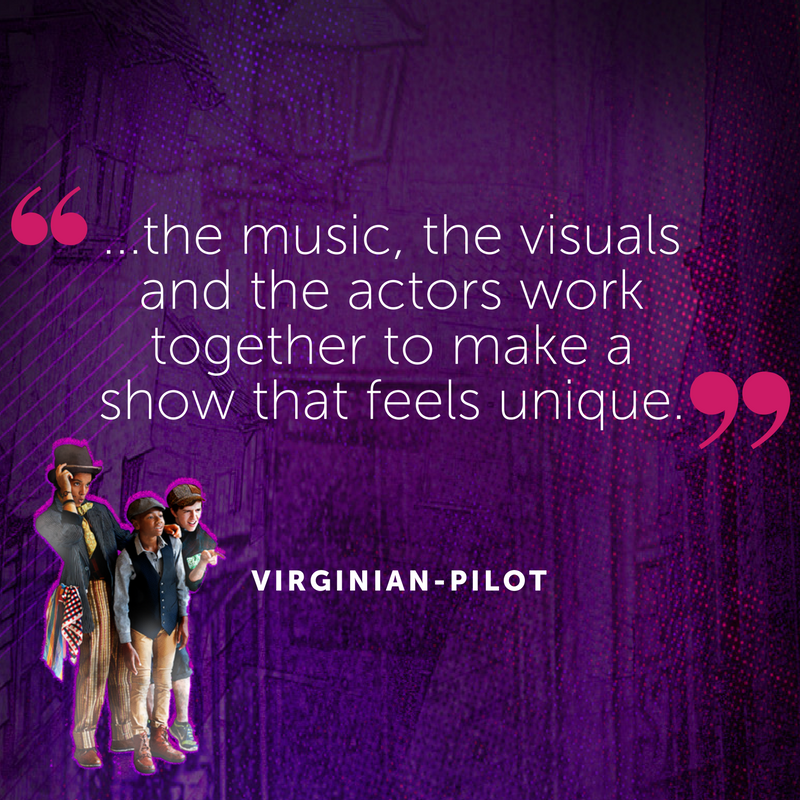Social inequality is at the core of Virginia Stage Company's new take on "Oliver Twist"
BA Ciccolella
November 8, 2016
In Virginia Stage Company’s new version of “Oliver Twist,” Patrick Mullins shows that he knows how to adapt Dickens for the stage.
“Oliver Twist” is the story of the little British orphan who was born in a workhouse and ill-used by pretty much everyone – “caretakers” like Mr. Bumble the Beadle and Mrs. Mann, criminals like Fagin, the Artful Dodger, Bill Sikes and Nancy, and even Oliver’s half-brother, Monk – until he is saved by good fortune and a few kind souls, including poor Nancy.
Mullins, also the director, worked with Jake Hull, a local singer and songwriter who created new music for this production. Hull’s work leans toward more modern-sounding pop songs but has hints in the music that throw us back to the 1800s. The lyrics throw into sharp relief the class differences and struggles we see in the story.
Mullins and Hull capture more of Dickens’ intent than the well-known musical “Oliver!,” showing that poverty is a matter of circumstance rather than character, as well as a by-product of public policy, and going far beyond the musical’s tale of a plucky orphan who happens to get lucky.
Hull’s at times hauntingly repetitive music easily connects our story from the workhouse to Fagin’s hideout to well-to-do sections of London.
The musical starts by taking its beat and tempo from a boxer, whose face we never see, hitting a punching bag. That device sets just the right tone for the brutality and violence inherent to the story, and it is used repeatedly to convey violence suffered by the characters, while not showing it directly to the audience.
Virginia Stage Company worked closely with the Governor’s School for the Arts on this production, and the almost 20 students in the ensemble did a good job keeping up with their professional counterparts. David Hopkins, 13, from the Hurrah Players, and Mikael Gemeda-Breka, from the GSA, did so well as Oliver and the Artful Dodger that it was very easy to forget that they are students. An audience favorite from the student cast was Dale Van Slyke, whose work included skillfully puppeteering Sikes’ dog, Bullseye.
The adults were wonderfully cast, with Ailish Riggs (Mrs. Mann) and John Forkner (Bill Sikes) both bringing a strong dose of humanity to characters typically treated as caricatures. After watching Forkner and Meredith Noël (Nancy), it was easy to understand why Nancy, who is such a strong character, stays in her abusive relationship. Noël’s monologue on their bond toward the end of the play was particularly heartbreaking.
Technically the show was well executed, but not without a few faults. It was difficult sometimes to hear Hull’s singing over his own piano playing and the cello accompaniment by Amos Housworth from The Last Bison. Also, it sometimes was hard to hear the parade of young narrators, perhaps because of the one-size-fits-all setup for the microphones.
The lighting by Jared A. Sayeg was beautifully done, and worked very well with the abstract stage design. Nehprii Amenii is credited as “visual storyteller.”
The set is dominated by a multileveled scaffolding to which the “workers” added gears, keeping the looming threat of the workhouse in the audience’s mind for the entirety of the show. By dropping a sheer curtain in front of a level of the scaffolding, the crew created silhouettes of the actors during the most violent scenes, while the boxer came out and pounded on the bag. The effect was more profound than showing the violence firsthand.
VSC’s “Oliver Twist” is an interesting and new look at a classic story.
The style of the adaptation and storytelling is easily recognizable as Mullins’ to anyone who has seen his VSC adaptation of Dickens’ “A Christmas Carol.” However, the music, the visuals and the actors work together to make a show that feels unique.

